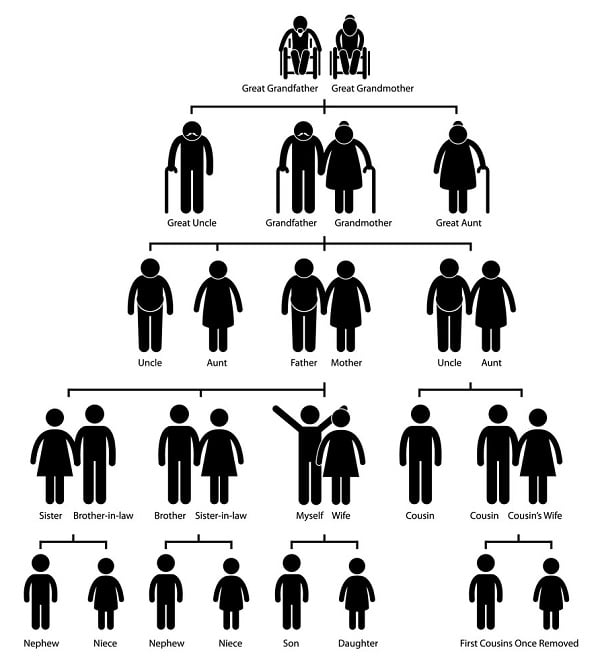Should You Research Your Genealogy?
If you’ve ever done a quick online search of your family name, you might have already found out some things that pique your interest. Researching your family genealogy can be a bit of a hobby or something more. There are also more apps and technology-based tools to help you along the way than ever before.
Below, we give you a guide as far as what to know about researching your family name and history and ideas for apps that you might try.

What is Genealogy?
Genealogy is when you trace your ancestors and descendants. In the simplest terms, it’s about learning the history of your family. There are often amazing stories people are compelled to learn more about when they start casually researching the history of their families.
The word itself comes from the Greek language and is broken down into “birth” and “science.”
For thousands of years, people have been researching, tracking, and documenting records, and humans have an innate desire to learn more about where they come from and what their family origins are.
Professional genealogists will use historical records, genetic analysis, and oral interviews, as well as other records, to get information about families and show the pedigrees of the members of the family. A genealogist might display their findings as charts or narratives.
In a historical sense, it’s always been an important endeavor because it allowed people to carve a place for their families in the greater picture of history. There’s also often an underlying sense of responsibility that people have to preserve records of the past for future generations.
Depending on how far you go, it can be a complex process.
What Are the Benefits of Researching Your Family History?
There are so many compelling reasons to consider studying your family history in whatever way you choose.
If you are interested in learning more about your family history, the fact that it interests you can be reason enough, but along with that, benefits include:
- Often people find a sense of purpose comes with researching their family history. Older people who are retirees, for example, tend to find that learning more about where they come from can enrich their lives, perhaps when they’re transitioning out of their role as full-time employees. The more you learn about your family, the more you might want to learn.
- Everyone not only wants but needs to feel a sense of connection and belonging. We need to have that feeling of something more than ourselves, so when you trace your family roots, it can help you connect to your sense of self and feel a stronger connection to not only your family but the world and history.
- Researching genealogy is mentally stimulating. It can keep your brain active and engaged and help improve your cognition.
- You can strengthen your connections not only with the past but also with your present family members. Family genealogy gives you the opportunity to share stories, and it can open up new conversations.
- In some cases, people research their family history to gain more information about their health.
- There are social groups for people who are generally interested in genealogy, so along the way, you might meet new friends.
- You might want to look for famous or infamous ancestors. People often make claims that they’re related to a well-known person in history and love being able to prove it.
- You can learn how your ancestors were involved in important parts of history, even if they weren’t necessarily famous for the part they played.
- For legal or financial reasons, you might need to do research to find heirs to family inheritance or to determine who owns land.
- There are lineage societies that require you to show your direct line to an ancestor to join. For example, the Daughters of the American Revolution will require you to show a direct line to an ancestor that would qualify you.
- You might find relatives you can connect with who maybe you never even knew existed. Some people like to do genealogy research to find people who live in other parts of the world.
- You can gather family research to write a book, such as a piece of historical fiction that’s based on your family in some way.
Apps and Sites You Can Use for Research
There are plenty of great apps and sites you can use to research your genealogy. The easiest place to start, however, is with a simple Google search and maybe a bit of a background search. If you’re ready to go more in-depth, consider the following:
Ancestry.com
Ancestry.com is the most well-known and popular research tool for learning more about your heritage.
You can use the website, or you can use the app platform. When you use the app, you’ll get notified if there are new records. The app has a lot of the same features as the website, and you can go through millions of records. Ancestry also searches state archives and newspaper clippings.
With the app, you can build your family tree and then share it through the app, and also share things that you find along the way if you think they’re interesting.
Most users say the app’s records are pretty well-optimized for viewing on your mobile device, but the text transcription varies in how well it works.
MyHeritage
MyHeritage is cheaper to become a member of the app than Ancestry, and one way this platform excels is through its data privacy stance.
The MyHeritage DNA Kit is an autosomal DNA test. You can discover relatives through DNA matches. You can also get an ethnicity breakdown by percentage, based on more than 40 ethnic regions around the world.
According to MyHeritage, your first 22 of 23 pairs of chromosomes are known as autosomal. The autosomal DNA test looks at these 22 pairs, trying to identify segments that match between different people.
If two or more people have the same DNA segments, they’re considered a match. It’s highly likely they’re relatives, although it can be close or distant.
You can just opt to do the DNA kit from MyHeritage, or you can do a full membership which also lets you research your family history and build a family tree.
There are a lot of unique features that come with a full membership, including the option to restore family photos or portraits. You can colorize pictures with the app and animate your family photos.
Findmypast
If you want to learn more about potential British and Irish heritage as an American, you might try Findmypast. The genealogy tool is UK-based, and it partners with the National Archives of Ireland as well as the British Newspaper Archive to find historical records.
You can go through the platform to hire an expert UK researcher who will have a deep knowledge of national records as well.
Particular features of the Findmypast app include:
- You can search billions of records
- Add new relatives when you learn about them
- Share your findings when you discover things that are interesting
- Get notifications when the research team finds vital records like birth, death, or marriage certificates
- You can add photos to your family tree
Who Do You Think You Are?
The Who Do You Think You Are app is a companion to the successful British TV show by the same name.
The app is a little different from the others. You can find advice and expert tips on how to build your family tree, primarily. You’ll also learn about how you can maximize your use of online resources during your search.
Find a Grave
The Find a Grave website and app let you look up the graves of your ancestors and search and browse cemeteries and grave records for anyone.
The app is the largest free resource for burial information. You can search more than 180 million worldwide cemeteries, and you can add a memorial or a photo.
RootsMagic
You can use this app, which is a companion product to the desktop genealogy software at the same time, to research, organize and share your family history. If you don’t have the RootsMagic platform for desktop, you can still use the free version of the app.
HistoryPin
Finally, Historypin is where you can go to share stories and photos and tell stories of communities, according to the app’s creators. HistoryPin is a user-generated digital archive of photos, videos, audio recordings, and more.
Users can use the date and location of their content to pin it to Google Maps. If Google Street View is available, a user can overlay photos from history and compare them to a modern location. The project was created by a non-profit as part of intergenerational work, which was funded and supported by Google as part of an initiative for more digital inclusion.
There are so many resources available if you’d like to get started exploring your history and the history of your family. The available technology makes it an exciting time to undertake this kind of project.
